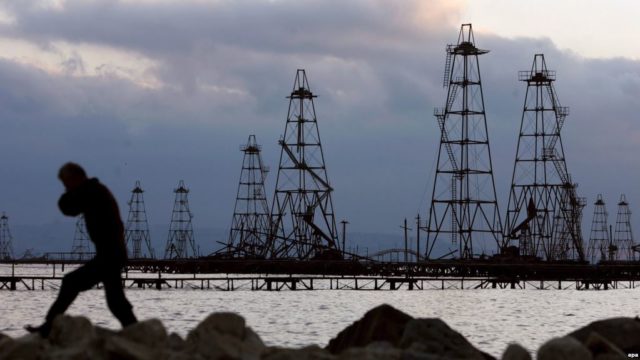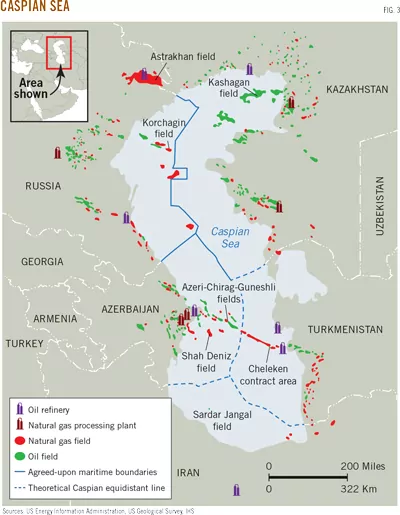
Azerbaijan, Iran Reach Breakthrough on Disputed Fields in the Caspian Sea
Publication: Eurasia Daily Monitor Volume: 15 Issue: 52
By:

Iranian President Hassan Rouhani paid an official visit to Baku, Azerbaijan, on March 28. During the visit, Azerbaijan and Iran signed a memorandum of understanding on joint development of offshore hydrocarbon fields in the Caspian Sea (President.az, March 28). Remarkably, the names of the fields were not specified, though they were officially referred to as “relevant.” In fact, these hydrocarbon fields are ones long disputed by Azerbaijan and Iran in connection with the unsettled legal status of the Caspian Sea (APA, 1news.az, March 29). Baku and Tehran used a neutral term to refer to them, perhaps to avoid any discomfort associated with the related embarrassing incidents of the recent past. For instance, in 2001, Iranian gunboats and aircraft threatened Azerbaijani survey ships working on the Alov-Sharg-Araz structure contested by Tehran; and as a result, BP, the operator of the oil field suspended its operations there (Anspress, August 21, 2015; Energy Policy Turkey, January 9, 2016). The disputed fields have since remained undeveloped. President Rouhani’s remarks that “the fields should serve for the benefit of both nations instead of remaining locked up in the sea” echoes a certain level of pragmatism in making the bilateral deal (President.ir, March 28).

The status of the Caspian Sea was regulated by agreements between the Soviet Union and Iran until the dissolution of the former. Disagreements arose following the emergence of new independent states on the shores of the sea—Azerbaijan, Kazakhstan, Turkmenistan and the Russian Federation (Jamnews, December 6, 2017; Contact.az, December 25, 2017). Today, the disagreements can be loosely classified into two categories: first, contested maritime borders and related disputes over hydrocarbon fields; and second, construction of a trans-Caspian energy pipeline and the presence of non-littoral states in the Caspian Sea.
Azerbaijani-Iranian and Azerbaijani-Turkmenistani disputes persist over various hydrocarbon fields in the Caspian Sea. Russia and Kazakhstan also disagreed over the ownership of three fields—Kurmangazy, Khvalynsk and Tsentralnoye—in the northern part of the Caspian Sea. But Astana and Moscow managed to settle their disputes with agreements reached in 1998 and 2002. Under the Russian-Kazakhstani settlement, the three fields were to be jointly developed, with Kurmangazy falling under the sovereignty of Kazakhstan, and Khvalynsk and Tsentralnoye under that of Russia (Mid.ru, 2004; Azernews, January 6, 2015). Similar issues and other details are yet to be worked out between Baku and Tehran. On top of that, Iran is reportedly preparing to develop a huge Caspian oil and natural gas field called Sardar-e Jangar. But Azerbaijan and Turkmenistan appear to also have claims to it—though so far, low-profile ones (Haqqin.az, August 24, 2014, November 8, 2015; Shana.ir, March 1, 2014, June 14, 2016; Financial Tribune, June 27, 2015; Virtualaz.org, November 10, 2017; Caspianenergy.net, November 24, 2015; Cyberleninka.ru, 2016). Nonetheless, the signing of the Azerbaijani-Iranian memorandum of understanding is a breakthrough in the long-deadlocked problem, as the dispute had been a sticking point.
The Azerbaijani-Iranian deal as well as the Russian-Kazakhstani agreement may serve as convincing precedents for the dispute between Turkmenistan and Azerbaijan. Indeed, reports on Azerbaijani media, including state television, have suggested the deal with Iran could be a precedent for the disputed hydrocarbon field between Azerbaijan and Turkmenistan (Atv.az, March 29; Azerbaijan-news.az, March 30; Baki-xeber.com, March 31). The field is referred to as Kapaz by the Azerbaijani side and Sardar by the Turkmenistani side. A major dispute over the possession of the field first broke out in the 1990s, leading to serious tensions between Ashgabat and Baku in 2012 (Azernews, July 4, 2012). Starting from 1997, Azerbaijan offered to jointly develop the field with Turkmenistan. But Ashgabat never accepted the offer, claiming full ownership (Energy Policy Turkey, January 9, 2016).
Now, there are significant incentives to reach a deal on joint development of the disputed Kapaz/Sardar field. First, as noted above, the pragmatism displayed in the earlier Russian-Kazakhstani and Azerbaijani-Iranian deals can act as a precedent. Second, Ashgabat lacks the necessary costly infrastructure and access from Turkmenistan to develop offshore oil reserves on its own (RFE/RL, September 12, 2000). Moreover, volatile and lower energy prices in recent years have hit the economies of both Turkmenistan and Azerbaijan, seriously undermining their ability to afford multi-billion-dollar investments in offshore development projects. Thus, taking into account uncertainty dominating energy prices at present, joint development would also mean sharing the risk should oil prices again begin to drop in the future. Third, delivering the offshore Caspian oil to global markets, particularly to Europe, would be a tall order for Ashgabat, which is unable to export its natural gas to Europe due to the failure to construct a trans-Caspian pipeline (Tdh.gov.tm, May 30, 2017; CACI Analyst, November 15, 2017). Joint development of the fields with Baku would allow Ashgabat to transport the produced oil using Azerbaijan’s existing transportation infrastructure. Fourth, a possible Azerbaijani-Turkmenistani compromise deal on the dispute could facilitate development of a trans-Caspian natural gas pipeline to transit the latter’s gas westward (EurasiaNet, December 13, 2017).
Russia and Iran are opposed to any trans-Caspian pipelines to transport oil and gas across the Caspian Sea; so far, they have effectively blocked construction of one. Furthermore, Moscow and Tehran are seeking to ensure that the Caspian Sea remains free of any military presence of non-littoral states (Stoletie.ru, November 3, 2011; Flot.com, September 29, 2014; Mehrnews, December 5, 2017). Azerbaijan, Kazakhstan and Turkmenistan have voiced no serious opposition to that. However, they could try to seek concessions from Russia and Iran on removing obstacles to the possible construction of a trans-Caspian pipeline and other related issues in exchange for their further consent on the matter.
The deal between Baku and Tehran also somewhat helps to justify Russian Foreign Minister Sergei Lavrov’s expressed optimism regarding the possible signing of a final document on the legal status of the Caspian Sea at the fifth summit of the Caspian littoral states, to be held in Kazakhstan in the coming months (Mid.ru, December 5, 2017). Therefore, the Azerbaijani-Iranian deal on the joint development of offshore hydrocarbon fields represents considerable progress toward the broader settlement of the legal status of the Caspian Sea.



